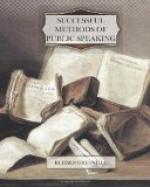There is a valuable suggestion for the student of public speaking in this description of Lincoln’s boyhood: “Abe read diligently. He read every book he could lay his hands on, and when he came across a passage that struck him, he would write it down on boards if he had no paper, and keep it there until he did get paper. Then he would rewrite it, look at it, repeat it. He had a copy book, a kind of scrap-book, in which he put down all things, and thus preserved them.”
Daniel O’Connell
Daniel O’Connell was one of the most popular orators of his day. He had a deep, sonorous, flexible voice, which he used to great advantage. He had a wonderful gift of touching the human heart, now melting his hearers by his pathos, then convulsing them with his quaint humor. He was attractive in manner, generous in feeling, spontaneous in expression, and free from rhetorical trickery.
As you read this brief sketch of some of the world’s great orators, it should be inspiring to you as a student of public speaking to know something of their trials, difficulties, methods and triumphs. They have left great examples to be emulated, and to read about them and to study their methods is to follow somewhat in their footsteps.
Great speeches, like great pictures, are inspired by great subjects and great occasions. When a speaker is moved to vindicate the national honor, to speak in defense of human rights, or in some other great cause, his thought and expression assume new and wonderful power. All the resources of his mind—will, imagination, memory, and emotion,—are stimulated into unusual activity. His theme takes complete possession of him and he carries conviction to his hearers by the force, sincerity, and earnestness of his delivery. It is to this exalted type of oratory I would have you aspire.
EXTRACTS FOR STUDY, WITH LESSON TALK
EXAMPLES OF ORATORY AND HOW TO STUDY THEM
It will be beneficial to you in this connection to study examples of speeches by the world’s great orators. I furnish you here with a few short specimens which will serve this purpose. Carefully note the suggestions and the numbered extract to which they refer.
1. Practise this example for climax. As you read it aloud, gradually increase the intensity of your voice but do not unduly elevate the key.
2. Study this particularly for its suggestive value to you as a public speaker.
3. Practise this for fervent appeal. Articulate distinctly. Pause after each question. Do not rant or declaim, but speak it.
4. Study this for its sustained sentences and dignity of style.
5. Analyze this for its strength of thought and diction. Note the effective repetition of “I care not.” Commit the passage to memory.
6. Read this for elevated and patriotic feeling. Render it aloud in deliberate and thoughtful style.




